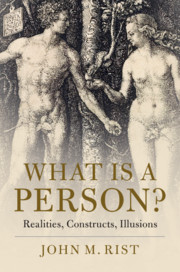Book contents
- What is a Person?
- What is a Person?
- Copyright page
- Contents
- Acknowledgments
- Introduction
- Part I Constructing the ‘Mainline Tradition’
- 1 The First Foundations: Plato and Aristotle
- 2 From Stoic Individuals and Personae to Christian Persons
- 3 Mixtures: Plotinus, Porphyry, Nemesius
- 4 Augustine’s Personae: Theology, Metaphysics, History
- 5 The Definition: Boethius and Richard of Saint Victor
- 6 Toward a Synthesis: Thomas Aquinas
- 7 Between Two Worlds: Duns Scotus
- Part II No God, no Soul: What Person?
- Part III Toward Disabling the Person
- Part IV Persons Restored or Final Solution?
- Epilogue or Epitaph?
- Appendix The World of Rights Transformed Again
- Bibliography
- Index
1 - The First Foundations: Plato and Aristotle
from Part I - Constructing the ‘Mainline Tradition’
Published online by Cambridge University Press: 05 December 2019
- What is a Person?
- What is a Person?
- Copyright page
- Contents
- Acknowledgments
- Introduction
- Part I Constructing the ‘Mainline Tradition’
- 1 The First Foundations: Plato and Aristotle
- 2 From Stoic Individuals and Personae to Christian Persons
- 3 Mixtures: Plotinus, Porphyry, Nemesius
- 4 Augustine’s Personae: Theology, Metaphysics, History
- 5 The Definition: Boethius and Richard of Saint Victor
- 6 Toward a Synthesis: Thomas Aquinas
- 7 Between Two Worlds: Duns Scotus
- Part II No God, no Soul: What Person?
- Part III Toward Disabling the Person
- Part IV Persons Restored or Final Solution?
- Epilogue or Epitaph?
- Appendix The World of Rights Transformed Again
- Bibliography
- Index
Summary
Aristotle tells us that apart from individual men there is no Man; that is, the word ‘man’ is used simply to designate the set of human beings all of whom share a common humanity. He implied that particular individuals (neither individuals in general nor individuality as such) are the cause of human individuals; the individuals who were my parents are the cause of the individual person who is me. Starting from that axiom, I shall try to answer four related questions:
1. How can we best understand individual persons?
2. What, if any, metaphysical and axiological implications are to be derived from such ever-improvable understanding?
3. Are there any coherent reasons to claim that each person is not only unique but further is possessed of intrinsic dignity?
4. If we all possess equal dignity, are our obligations to all members of the human race identical?
- Type
- Chapter
- Information
- What is a Person?Realities, Constructs, Illusions, pp. 13 - 21Publisher: Cambridge University PressPrint publication year: 2019

